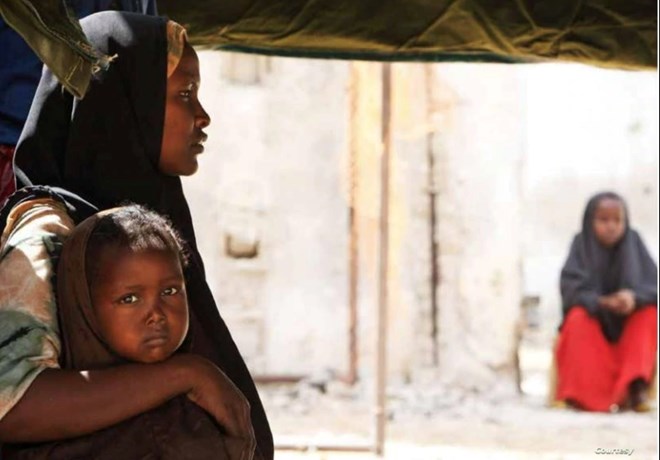
By Mohamed Olad Hassan
Saturday June 20, 2020

Insecurity, gender inequality and recurring humanitarian crises heighten risks for sexual violence in Somalia, the United Nations says. (UN Photo/Stuart Price)
Forcibly displaced by drought and extremist violence in southwestern Somalia, Fadumo Mohamed Abdi thought she had found safety in the Puntland region's northeastern city of Bosaso.
But one day in May 2019, while she and three other women were gathering firewood on the outskirts of their camp, they were accosted by four armed men, she said.
"The other three women managed to escape, but unfortunately I could not. They raped me repeatedly and left me unconscious," Abdi told VOA's Somali service in a phone conversation Friday.
Abdi was hospitalized for several days and, more than a year later, still bears trauma from the episode. Her disabled husband and their nine children had depended on her to collect fuel, but she remains too fearful to venture back into the woods. Instead, she relies on her sisters and friends.The toll of sexual violence extends well beyond a single person or family, the United Nations said in marking Friday's annual observance of International Day for the Elimination of Sexual Violence in Conflict.
"It reverberates throughout communities and societies, perpetuating cycles of violence and threatening international peace and security," U.N. Secretary-General António Guterres said in a statement.
The COVID-19 pandemic has heightened the challenges in areas with armed conflict, Guterres said, because "reporting crimes may be difficult; shelters and clinics may be closed."
Guterres commended frontline workers who have found ways to support survivors "despite lockdowns and quarantines." And, his statement concluded, "We must prevent and end these crimes; place survivors at the center of our response; hold perpetrators accountable; and expand support for all those affected."
Abdi said that, as far as she knew, there has been no investigation and her attackers are still at large.
"We are poor. We cannot afford a lawyer" to help the family seek justice, she said.
According to U.N. Women, an estimated 35% women globally have suffered sexual violence. Risks exist even at home. The group reported in April that an estimated 243 million females experienced sexual violence by an intimate partner within a 12-month span.
In Somalia last year, 241 of 744 reported rapes involved conflict-related sexual violence, the U.N. office there found.
Rape and other acts of sexual violence often go unreported and unpunished in the Horn of Africa country, groups such as Human Rights Watch say, because of a culture of impunity and stigma.
Somalia, wracked by civil war since its central government collapsed in 1991, divided itself into regions and fiefdoms ruled by rival clan leaders and warlords. There's no strong, common rule of law.
Legal changes
Changing attitudes have brought some legal developments.
In 2016, semiautonomous Puntland became the first regional state in Somalia to criminalize sexual assault. In February, authorities executed two men convicted of the abduction, gang rape and murder of a 12-year-old girl in 2019.
In 2018, the northern region of Somaliland passed a law that allows prison sentences of up to 30 years for convicted rapists. That same year, Somalia's cabinet ministers drafted legislation, still being considered by the Parliament, to outlaw sexual offenses, including exploitation, trafficking, slavery and forced marriage. It would require investigations into rape allegations and ban clan-based settlements of sexual violence charges.
Abdulkadir Mohamed Warsame, an activist in Puntland, said assaults on minors have brought "a traumatic pain in the hearts of Somalis. … Although steps were taken toward bringing the culprits to justice, that is not enough to eradicate the crime," he added, calling for establishing "a special unit that monitors sexual violence in conflict."
An assault in April sparked a public outcry and more demands for action.
Two girls — ages 2 and 3 — were abducted from their home in Afgoye, a town about 30 kilometers southwest of Somalia's capital, Mogadishu, in an area frequented by al-Shabab militants. The next day, a farmer found them in a field, alive but sexually assaulted and traumatized, the town's mayor told VOA.
James Swan, the U.N.'s special representative for Somalia, is urging the country's leaders and residents to do more "to assist and listen to victims and survivors of conflict-related sexual violence."
"Conflict-related sexual violence inflicts deep personal wounds and remains a violation of the human rights of the victims," he said. "It also scars the fabric of society and the country and has no place in the modern, emerging Somalia."